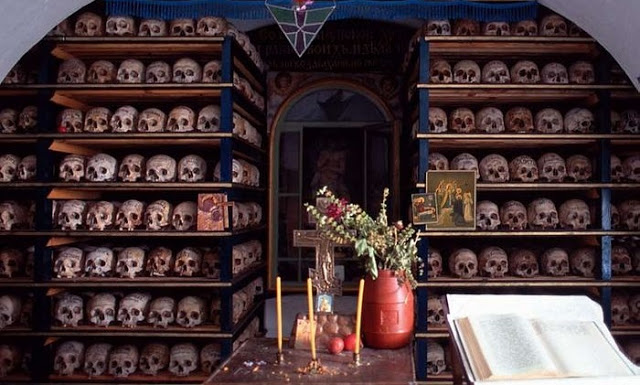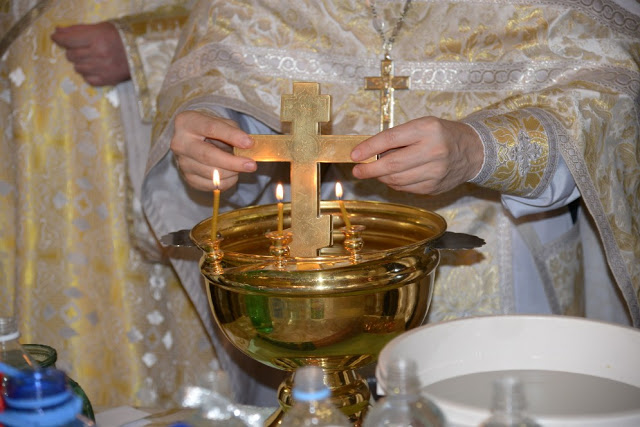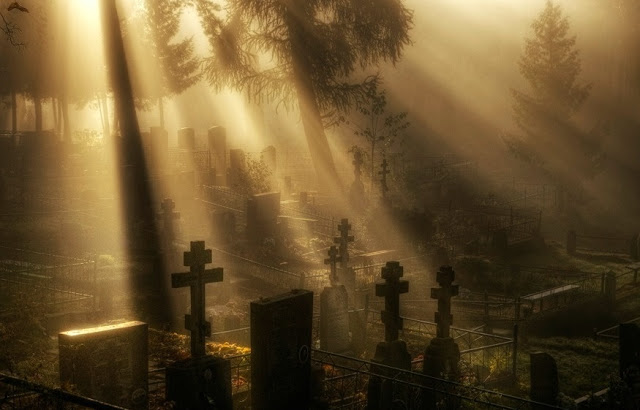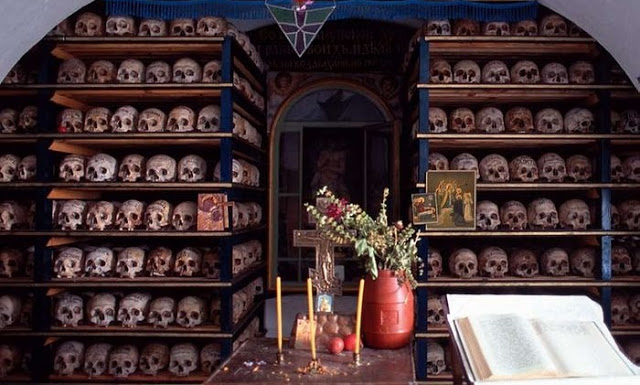
Question: If someone dies without repentance, is it possible for such a person to repent after death? Fr. John Whiteford answers this question through the writings of the holy fathers of the Church.
Answer: Scripture, as explained by the Fathers of the Church, states that this is not possible.
Psalm 6:5 says:
“For in death there is none that is mindful of Thee, and in hades who will confess Thee?”
Commenting on this passage, St. John Chrysostom says:
[The Prophet David is] not implying that our existence lasts only as far as this present life: perish the thought! After all, he is aware of the doctrine of the resurrection. Rather, it is that after our departure from here there would be no time for repentance. For the rich man praised God and repented, but in view of its lateness it did him no good [Luke 16:19-31]. The virgins wanted to get some oil, but no one gave any to them [Matthew 25:1-13]. So this is what this man requests, too, for his sins to be washed away in this life so as to enjoy confidence at the tribunal of the fearsome judge (St. John Chrysostom: Commentary on the Psalms, vol. I, trans. Robert C. Hill (Brookline, MA: Holy Cross Orthodox Press, 1998), p. 102).
St. Jerome says:
While you are still in this world, I beg of you to repent. Confess and give thanks to the Lord, for in this world only is he merciful. Here, He is able to be compassionate to the repentant, but because there He is judge, He is not merciful. Here, He is compassionate kindness; there, He is judge. Here, He reaches out His hand to the falling; there, He presides as judge (Homily on Psalm 105[106], quoted in Ancient Christian Commentary on Scripture: Old Testament, Vol. VII, Craig A. Blaising and Carmen S. Hardin, eds. (Downers Grove, IL: Intervarsity Press, 2008) p. 51).
St. Gregory the Theologian says:
It is better to be punished and cleansed now than to be transmitted to the torment to come, when it is the time of chastisement, not of cleansing. For as he who remembers God here is conqueror of death (as David has most excellently sung) so the departed have not in the grave confession and restoration; for God has confined life and action to this world, and to the future the scrutiny of what has been done (On His Father’s Silence, Oration 16:7).

St. Basil the Great says:
In like manner they which have grieved the Holy Spirit by the wickedness of their ways, or have not wrought for Him that gave to them, shall be deprived of what they have received, their grace being transferred to others; or, according to one of the evangelists, they shall even be wholly cut asunder—the cutting asunder meaning complete separation from the Spirit. The body is not divided, part being delivered to chastisement, and part let off; for when a whole has sinned it were like the old fables, and unworthy of a righteous judge, for only the half to suffer chastisement. Nor is the soul cut in two—that soul the whole of which possesses the sinful affection throughout, and works the wickedness in co-operation with the body. The cutting asunder, as I have observed, is the eternal separation of the soul from the Spirit. For now, although the Spirit does not suffer admixture with the unworthy, He nevertheless does seem in a manner to be present with them that have once been sealed, awaiting the salvation which follows on their conversion; but then He will be wholly cut off from the soul that has defiled His grace. For this reason “In Hades there is none that maketh confession; in death none that remembereth God,” because the help of the Spirit is no longer present (Treatise on the Holy Spirit, 40).
Blessed Theodoret says:
For this reason I beg the privilege of enjoying the cure in the present life, since I know that no cure will then be granted those departing this life with wounds, as there is no longer any room for repentance. This was exceptionally sound thinking on the part of the divine David: it is not in death but in life that one recalls God. Likewise, confession and reform do not come to the departed in Hades: God confined life and action to this life; there, however, he conducts an evaluation of performance. And in any case this is proper to the eighth day, giving no longer opportunity for preparation by good or bad deeds to those who have arrived at it; instead, whatever works you have sown for yourself you will have occasion to reap. For this reason he obliges you to practice repentance here, there being no practice of this kind of effort in Hades. He says, in fact, “Since the opportunity coming to me for repentance was lengthy, I am afraid death may precede your mercy, there being no room for confession there—hence my request for your to be quick with your mercy.” Then he instructs the listener that along with God’s loving-kindness our effort is required, too: whether we plead weakness or confusion or God’s goodness without contributing what is ours, it is of no benefit to us (Theodoret of Cyrus: Commentary on the Psalms, 1-72, trans. Robet C. Hill (Washington, D.C.: Catholic University of America Press, 2000), p. 75).
St. Augustine says:
For in death there is no one that is mindful of Thee. He knows too that now is the time for turning unto God: for when this life shall have passed away, there remaineth but a retribution of our deserts. “But in hell who shall confess to Thee?” That rich man, of whom the Lord speaks, who saw Lazarus in rest, but bewailed himself in torments, confessed in hell, yea so as to wish even to have his brethren warned, that they might keep themselves from sin, because of the punishment which is not believed to be in hell. Although therefore to no purpose, yet he confessed that those torments had deservedly lighted upon him; since he even wished his brethren to be instructed, lest they should fall into the same (Commentary on the Psalms 6:6).
Cassiodorus says:
This may elicit the question, why does he say that in death no one is mindful of God, whereas then we can be made to tremble more by the imminent anger of God? But when we speak of those unmindful of God, this properly refers to the unfaithful. Isaiah said of them: For those in hell will not praise thee, nor will those who are dead bless thee. When Paul says: In the name of of Jesus let every knee bow, of those that are in heaven, on earth, and under the earth, the statement should be taken as referring only to the faithless and obstinate, who deserve to have no trust placed in their confession. So the psalmist rightly hastens to gain acquittal here, since once the sun has set nothing remains except deserved retribution. Who shall confess to thee in hell? We must mentally add “to win pardon.” Compare Solomon’s words on impious men: For they will say among themselves, repenting and groaning for anguish of spirit, and the rest. Then too we know that the rich man who saw Lazarus settled in peace confessed his evil plight, but he was not heard praying for help because it is in this world that confession connotes also obtaining pardon. To help us realize that some distinction is being made in the words of the verse, in death means passing from life, whereas in hellmeans hugging the place where souls are known to endure what they have deserved. There is total denial that a confession can be made in each of these situations (Cassiodorus: Explanation of the Psalms, Vol. 1, trans. P. G. Walsh, (New York: Paulist Press, 1990), p. 94f).
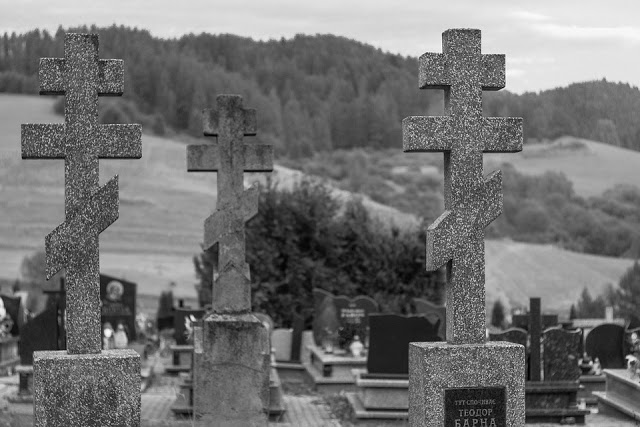
We find a very similar passage in Isaiah 38:18-19, which Cassiodorus references:
For they that are in the grave shall not praise thee, neither shall the dead bless thee, neither shall they that are in Hades hope for thy mercy. The living shall bless thee, as I also do: for from this day shall I beget children, who shall declare thy righteousness.
St. Cyril of Alexandria says:
What is said in the psalm verse contains sentiments similar to this passage, What value is there in my death if I descend into corruption? Dust will not praise you or proclaim your marvels [Psalm 29[30]:9]. In other words, once dead, and enclosed in the gates of Hades, they will cease giving praise. Nothing further could be added to what has been achieved; instead, they will remain in the condition in which they were left, and will await the time of the general judgment. So he is saying that it is the living, with the power of doing good on receipt of benefits who will bless you, as I do (Cyril of Alexandria: Commentary on Isaiah, Vol. II, trans. Robert C. Hill (Brookline, MA: Holy Cross Orthodox Press, 2008), p. 300).
So here you have all of the Three Great Hierarchs, along with two great Latin Saints, St. Cyril of Alexandria (the preeminent Father of the Third Ecumenical Council), as well as two notable patristic commentators all saying essentially the same thing: the time for repentance is in this life. If you have not repented before death, it will then be too late.

